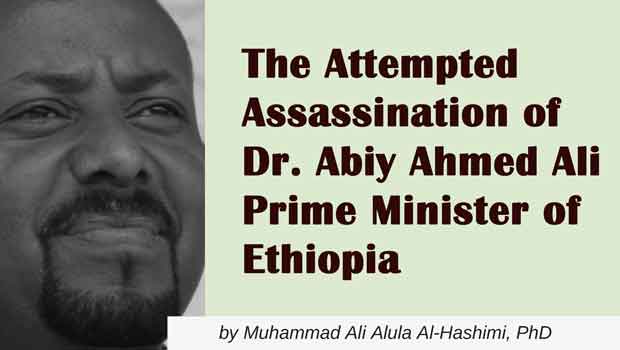The Attempted Assassination of Dr. Abiy Ahmed Ali, Prime Minister of Ethiopia
–
It all happened on a bright, sunny day on the 23rd of June, 2018 (the 9th of Shawwal 1439) in Addis Ababa, the capital of Ethiopia. A large, peaceful crowd began to form in Meskel Square to support and listen to the new prime minister, Dr. Abiy Ahmed Ali. By the time Dr. Abiy showed up, an extremely large crowd had already assembled. And it kept growing and growing as if it would never stop. Meskel Square had long since been filled to capacity and beyond. But the people kept coming, spilling out into the adjacent streets and open spaces. It has been estimated by some observers that more than 4 million people ultimately gathered in and beyond the Square.
Dr. Abiy, a man of the people, addressed the crowd, dressed in a sports hat, slacks, and a T-shirt. His bright green T-shirt had on its front side a large map of Africa. Imprinted inside the map was the image of the great African hero, the late Nelson Mandela, the first elected president of a free South Africa. No doubt that T-shirt had a symbolic message that Dr. Abiy wished to convey: that he, like the South African leader, was ready to take the Ethiopian people to a level of freedom and sustainable development never before realized in the land of the First Hijrah. In the two and half months that he had been in power as prime minister, he had shown the people of Ethiopia that this was indeed his chosen path of action, for he had taken bold and positive steps that his predecessors had not dared to take. He was not playing it safe; he was doing what he knew had to be done to calm the country down, a country that was on the verge of coming apart quite literally. And the people were already falling in love with this new, bold leader, this brave young Oromo son (the Oromo are the largest ethnic group in Ethiopia), the offspring of a Muslim father and Christian mother, for they had come by the millions to hear him speak.
Yet, on this day, an agent of evil was among the crowd. As Dr. Abiy completed his message of hope and unity, someone in the crowd took out a hand grenade and launched it at the stage. Fortunately, some members of the crowd were alert enough to somehow deflect the trajectory of the hand grenade, for it fell short of reaching the stage where Dr. Abiy was speaking. Unfortunately, the hand grenade exploded, killing two persons and wounding more than 165 others, five of these critically. Dr. Abiy was immediately whisked away by his aides to safety.
Who is this man, the 12th prime minister and first ethnic Oromo to lead the modern nation-state of Ethiopia? In just a few months in office, what has he done to endear himself so solidly with the Ethiopian people? Well, the short answer is that Dr. Abiy has moved with determined dispatch, with lightning speed to right many of the wrongs perpetrated on the people by the Ethiopian government over the past several years.
The Al-Ahbash Debacle of 2011
What are some of the significant events that led up to the coming to power of Dr. Abiy Ahmed Ali? Every person has his or her assessment of an event or series of events and I have my own particular perspective on the series of events that led up to the election of Dr. Abiy as prime minister by the House of Representatives. For me, that perspective begins in July of 2011. It was then that the Ethiopian government, under the then-leadership of Prime Minister Meles Zenawi, announced a new draconian policy on the Ethiopian Muslim community that would seriously curtail its freedom to practice its religion. The Ethiopian government, through the offices of the Ethiopian Islamic Affairs Supreme Council, called a conference to be attended by well-known Islamic leaders and scholars of Ethiopia. The scholars and leaders dutifully heeded the government summons. It was not long after the start of the conference that most of the attendees walked out in disgust at the proposals that were placed before them. The Ethiopian government was essentially delivering an edict — an edict that had been prepared with the help of Haggai Erlich, the Israeli-Zionist author specializing in Ethiopian history — that henceforth all Ethiopian Muslims would be mandated to follow the controversial teachings of the Lebanese Al-Ahbash Movement. The attendees could not believe what they were hearing. Here was a secular government dictating to the 40 million-plus Muslims of the Federal Republic of Ethiopia how they should, indeed must, practice their religion.
Clearly, the conference was an insult on three counts. First, the Ethiopian government, at the very least, was in violation of the Ethiopian Constitution. Article 11 of the Ethiopian Constitution under “Separation of State and Religion” says: (i) state and religion are separate; (ii) there shall be no state religion; and (iii) the state shall not interfere in religious matters and religion shall not interfere in state affairs. Second, the government apparently was showing complete contempt for Ethiopian Muslims by inviting an Israeli to help in its oppressive project. Third, and most egregious of all, was the government’s boldfaced audacity to think that Muslims anywhere, let alone in Ethiopia, could be dictated to about how to practice their religion. The first revelation, indeed command, to Prophet Muhammad (pbuh) was to, “Read in the name of your Sustainer, who created — created man from a clinging substance” (Quran, 96:1-2).
This fundamental command was meant to encourage every Muslim to study and learn to the maximum extent of his or her intellectual capacity the religion of Islam in all of its intricacies, with a free mind and free will, in order to arrive at a level of unassailable certainty as to the veracity of its teachings. Furthermore, it has been recorded in Quran that there is no compulsion of any kind in religion. But the Ethiopian government seemed to be hell-bent on compelling its Muslim citizens to believe in a way that had been chosen by the government. How ludicrous and indeed dangerous! The Ethiopian government apparently decided to court its own disaster in its unmitigated arrogance. The Muslims of Ethiopia, particularly the youth, were not going to sit idly by in the face of this horrendous insult.
Who Are the Ahbash?
The Lebanese Al-Ahbash Movement, also known as the Association of Islamic Charitable Projects, is a Sufi movement based in Lebanon. Yet, ironically it was founded by an Ethiopian shaykh, now deceased, by the name of ‘Abdullah ibn Muhammad ibn Yusuf al-Hirari al-Shi‘bi al-Abdari, also known as Abdullah al-Habashi. “Al-Habashi” comes from the Arabic word ahbash, meaning “Ethiopians,” and is the plural of the word habashi, or “Ethiopian.” Al-Ahbash, therefore, is a movement that devoutly follows the teachings of the late Shaykh Abdullah al-Habashi. By the late 1980s, Al-Ahbash had become one of Lebanon’s largest Islamic movements. It became a key player in Lebanese politics, attracting a wide following among the Sunni urban middle class by advocating pluralism and tolerance. Al-Ahbash established branches in Australia, Canada, Denmark, France, Sweden, Switzerland, the Ukraine, and the United States. However, this organization, which the Ethiopian government had decided to use as its tool of assault on Muslims, had a reputation for espousing teachings that are clearly outside the fundamental teachings of Islam, the most egregious of which is the policy of referring to those who call themselves “Salafi” or “Wahhabi” — often referred to as “Salafi-Wahhabi” because of the similarity between the two doctrines — as kafirs, or non-believers, in Islam. This is clearly an un-Islamic teaching on the part of al-Ahbash. Indeed, every Muslim knows that it is prohibited to call any Muslim a kafir if he or she — 1) bears witness that there is no deity worthy of worship except Allah (SWT), and that Prophet Muhammad (pbuh) is the last Messenger of Allah; 2) prays the five daily prayers; 3) pays the zakah—or charitable tax; 4) fasts during the month of Ramadan; and 5) makes pilgrimage to Makkah if financially able. The Salafi-Wahhabi adherents are no different from other Muslims in this respect in upholding the practice of these five principles or pillars of Islam.
Why the Government Called in Al-Ahbash
It became clear that it is this particular anti-Salafi and anti-Wahhabi teaching of Al-Ahbash that the government was most desirous of forcing down the throats of Ethiopian Muslims. In addition, the Ahbash have been chosen because they are a Sufi organization. This is important because a significant number of Muslims in Ethiopia are practitioners of Sufism, a practice in Islam that ideally encourages a Muslim to focus on spiritual development and therefore includes practitioners of all the schools of Islamic jurisprudence. Sufism, more properly called tassawuf in Arabic, is a practice among the global community of Muslims that goes back several centuries, almost to the time of Prophet Muhammad, may the peace and blessings of Allah be upon him. In fact, it was the great Imam Malik, author of what is regarded as the oldest extant book on Islamic jurisprudence, “Al-Muwatta,” who famously said, “He who practices Sufism without gaining knowledge in [Islamic] jurisprudence will become a heretic; [on the other hand] he who gains knowledge in jurisprudence without practicing Sufism will become corrupt; [but] he who gathers between the two has actualized.” To become “actualized” means to become balanced in your practice of Islam, fulfilling its legal requirements and internalizing its spiritual guidance. No doubt the Ahbash attitude towards Salafi-Wahabi Muslims compromises its spirituality, but in the eyes of Ethiopian government this is not important. The thought process for the government was that given that the Ahbash is a Sufi and anti-Salafi-Wahabi organization, they were perfect for the job of preaching to an Ethiopian population against the Salafi-Wahabi doctrine.
Here is the crux of the issue: the Ethiopian government had determined that the followers of the Salafi-Wahhabi doctrine in Ethiopia were a threat to the stability of the government and the country. The Ethiopian government apparently feared Salafi-Wahhabi activities in its midst, due to the high profile international exposure of al-Qaeda, an allegedly Salafi-Wahhabi group. However, the international context of al-Qaeda is much different from the national context of Ethiopian Muslims. This is what the government seemed unable to comprehend. And in that lack of comprehension was the basis of the government’s huge mistake in sparking street protests that would last for years.
So, in July of 2011, with this mindset and intent to call in the Ahbash, the government set about to dictate to the Muslims how they should think about and practice their religion. Clearly the government miscalculated. The Muslims, especially the youth, were in no mood to be dictated to! From that point on, the Muslims took to the streets and began to launch a consistent, continual protest against the heavy-handed arrogance of the government. The protests quickly spread among the Muslims across the country. Every Friday, thousands of Muslim protesters would gather at the Awoliya Mosque to listen to speeches from their leaders demanding a new majlis— or Muslim council— to replace the illegitimate Ahbash council the government had imposed upon them. This leadership, the Awoliya 17, as this group of young Muslim scholars came to be known, accused the government of treating them as terrorists, adding to their anger and heightened their sense of injustice.
Conclusion
I have attempted to present a summary of the Ethiopian government’s violation of the Ethiopian Constitution with regard to the prohibition of government interference in religious affairs. The government’s intervention was defended as necessary to maintain national security from the threat of what the government deemed as an external religious ideology, namely the Salafi-Wahabi school of thought in Islam. To counter this alleged threat, the government decided to force another external ideology, namely the Al-Ahbash school of thought, upon the Muslims of Ethiopia because the government felt that the Ahbash ideology was more in keeping with the traditional practice of Islam in Ethiopia. This forced imposition only lead to a country-wide protest that the government found impossible to quell.






